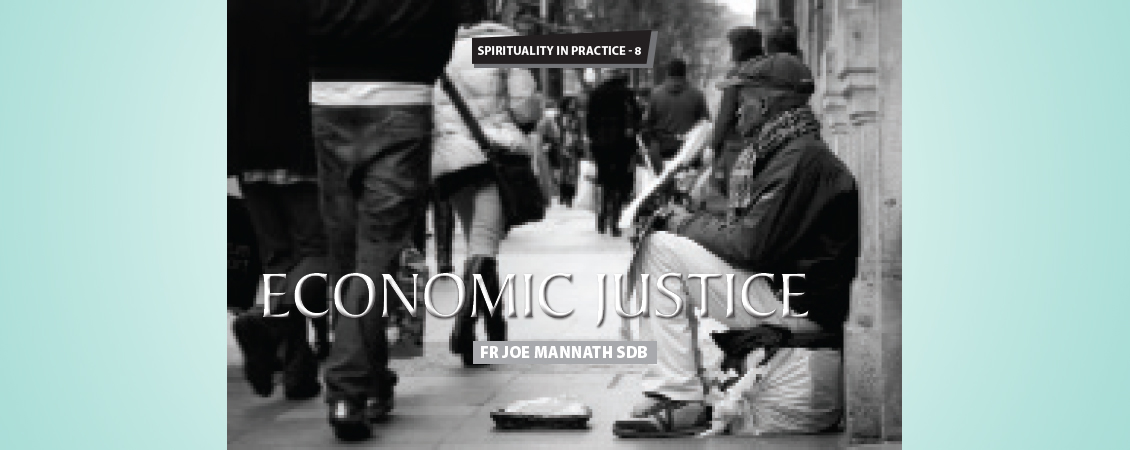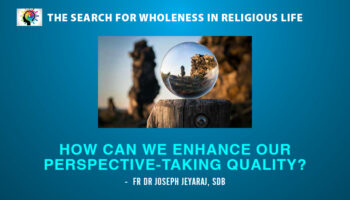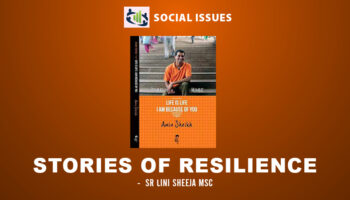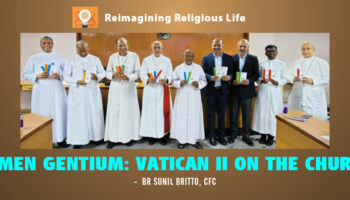Mrs Annie noticed a lady coming to church dressed in very poor clothes. In fact, the woman used the same old and tattered sari repeatedly. Wanting to help her without embarrassing her, Annie inquired discreetly who the woman was. She found out that the woman worked as a cook for a well-to-do Catholic man, a well-known businessman. This man had a name for being a prominent Catholic of the place. He was not only rich; he would host and ffinance prayer meetings. But one thing he did not do was to pay his workers a just salary or wage. The poor woman in question was being paid so little, she could not even buy new clothes with the salary she was getting. How come her employer, a so-called pious Catholic, did not see just wages as a part of Christian duty?
Archbishop Oscar Romero, who was canonized a few weeks ago, was killed, not for saying that he believed in Jesus, but for being on the side of the poor. He was murdered at the behest of wealthy, church-going landowners and politicians who hated him for speaking up for the victims.
In the last issue, I presented the three essential traits of spirituality—integrity, love and justice. Spirituality is not only or mainly a question of saying prayers or frequenting places of worship or sticking to a particular diet on special days. No, it is seen in our whole life. We cannot mark off a small or special area as spiritual, and consider the rest as unconnected to that.
One essential aspect of Christian spirituality is justice.
Justice means giving every person his or her due. It is different from charity or compassion. When I gift my new shirt to a poor person, it is charity. When I pay my workers a just salary, it is justice, not charity. They have a right to a just wage, unlike the poor man I mentioned, who has no right to my new shirt.
Access to power
Justice implies access to power.
What do I mean?
If I am too poor to study, or am deprived of chances to study because of my gender or for belonging to a particular ethnic group, then I have no access to the power that education would have given me. Thus, when Martin Luther King organized the African-Americans in the 1960s, he was not asking for charity; he was demanding the right to vote, the right to equal treatment.
Justice (or the lack of it) is especially seen in three areas of life—money, gender and ethnicity. Thus, I may a victim of injustice (like the cook I mentioned) because of not receiving a proper salary. Or I may be denied chances for education—or, worse still, murdered in infancy—because of my gender. Or I may not be allowed to draw water from the village well because I belong to a caste considered “low.” All three are cases of injustice.
They are also linked. Thus, the most inhumanly treated human beings in the world are poor women belonging to a race or caste or tribe considered low. She suffers economic injustice (unlike rich women), gender injustice (unlike the men of her group) and ethnic insults (unlike women and men from the so-called “higher” groups). Think of dalit women forced to clean the dry toilets of so-called “upper caste” people with their hands, and to whom, as payment, a couple of chappathis are thrown. What could be more degrading than that!
Pope Francis has launched the Day of the Poor (November 18th this year) to invite us to listen to the cry of the poor and to get involved on their side.
It is not enough we do some occasional charity and thus calm our conscience. No, we need to listen to the silent and vocal cries of the poor, reach out and make a difference. We need to, as the Pope says, be evangelized by the poor. How can we be “evangelized” or converted by the poor?
The poor as evangelizers
I remember a Jesuit priest—professor and formator who worked among poor fisherfolk and studied their life and spirituality—who told me, “I learnt spirituality better from the poor fisherfolk than from my Jesuit formation.”
Cut off from the struggles of life and the anguish of those who really suffer, we religious, priests and better-off lay people can develop a form of “spirituality” that is artificial, comfortable and undemanding, one that consists in a regimented routine, practices of piety and nice-sounding ideas we picked up from books or conferences. This may have very little to do with the teachings and example of Jesus. It is much easier to sing hymns in a beautiful chapel than to live poor among the poor (as Pope Francis did as a bishop) and to struggle at their side.
The Bible tells us: Let justice flow like the river. Remove oppression from your midst. Treat well the widow and the orphan. Be kind to the stranger in your midst.
In our formation houses, in our sermons and circulars, when we speak of spirituality, we must make sure we are not referring simply to the annual retreat, the daily Mass and other prayers, nor merely to periods of silence or fasting, but to a well-lived life of integrity (free of all crookedness), love (free of hatred, selfishness and revenge) and justice.
Justice demands (not simply exhorts, but really demands) that in our dealings as employers, government officials, church administrators and other posts where people depend us, we make sure that all dealings are just. People’s lives are sacred. Every one’s rights are sacred. Everyone has the right to be treated with respect as a human being. Among such rights are right to life, right to free speech, right to education and a decent standard of living. When such rights are forgotten or trampled upon, there is no spirituality to speak of, but only glorified hypocrisy. We may be active in cult, but failing in spirituality.
Such betrayals of Jesus’ message started early in the church. Saint Jerome wrote in the fourth century, “Why are we adorning the walls of the church with precious stones when Christ is dying in the poor?” (I am not saying that all or most church people were guilty of this, but that Jerome saw this abuse.)
That same challenge can, and must, be made to the way some of us live, to the way some churches and religious houses are constructed, to the way common funds are allotted. No wonder, there is also a vocal underground of opposition within the church to the present Pope’s leadership and life-style. A number of Catholics, including some church personnel, would prefer a comfortable church on the side of the powerful, rather than the compassionate and caring church of the poor which he is trying to lead us into. We need to ask: Which model is more faithful to Jesus Christ? The answer is pretty obvious, don’t you think?
To read the entire article, click Subscribe
Fr Joe Mannath SDB





